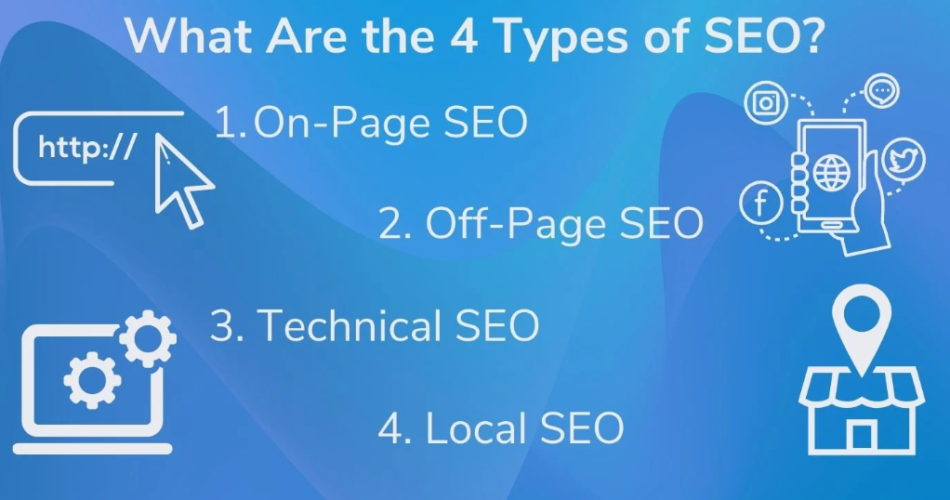Search Engine Optimization (SEO) is the backbone of digital marketing, helping websites rank higher on search engines like Google. But did you know that SEO isn’t a one-size-fits-all strategy? To truly master SEO, you need to understand what are the four types of SEO and how they work together to improve your website’s visibility. In this article, we’ll break down the four types of SEO—On-Page SEO, Off-Page SEO, Technical SEO, and Local SEO—and explain how each one contributes to your overall SEO strategy.
Contents
What Are the Four Types of SEO?
When people ask, “What are the four types of SEO?”, they’re referring to the core pillars of search engine optimization:
- On-Page SEO
- Off-Page SEO
- Technical SEO
- Local SEO
Each type focuses on a different aspect of your website and requires unique strategies to achieve success. Let’s dive deeper into each one.
1. On-Page SEO
On-Page SEO refers to the optimization techniques applied directly on your website to improve its search engine rankings. This type of SEO focuses on both content and HTML source code.
Key Elements of On-Page SEO:
- Keyword Optimization: Strategically placing keywords like “what are the four types of SEO” in titles, headers, meta descriptions, and throughout the content.
- Content Quality: Creating high-quality, engaging, and relevant content that answers user queries.
- Internal Linking: Linking to other pages on your website to improve navigation and distribute link equity.
- Meta Tags: Optimizing title tags, meta descriptions, and alt text for images.
- URL Structure: Using clean, descriptive URLs that include target keywords.
Why On-Page SEO Matters:
On-Page SEO ensures that your website is user-friendly and provides valuable information, which helps search engines understand and rank your content.
2. Off-Page SEO
Off-Page SEO involves activities outside your website that impact your rankings. The most important aspect of Off-Page SEO is building backlinks, but it also includes social signals and online reputation management.
Key Elements of Off-Page SEO:
- Backlinks: Acquiring high-quality links from authoritative websites to boost your site’s credibility.
- Social Media Marketing: Sharing content on platforms like Facebook, Twitter, and LinkedIn to drive traffic and engagement.
- Guest Blogging: Writing articles for other websites to build authority and earn backlinks.
- Brand Mentions: Getting your brand mentioned on other websites, even without a link.
Why Off-Page SEO Matters:
Off-Page SEO helps search engines determine your website’s authority and trustworthiness, which are critical ranking factors.
3. Technical SEO
Technical SEO focuses on improving the technical aspects of your website to help search engines crawl and index your site more effectively.
Key Elements of Technical SEO:
- Site Speed: Ensuring your website loads quickly to improve user experience.
- Mobile-Friendliness: Making sure your site is responsive and works well on all devices.
- XML Sitemaps: Creating and submitting sitemaps to help search engines understand your site structure.
- Structured Data: Using schema markup to provide context about your content to search engines.
- Crawlability: Fixing broken links, optimizing robots.txt files, and ensuring proper indexing.
Why Technical SEO Matters:
Technical SEO ensures that search engines can access and understand your website, which is essential for ranking well.
4. Local SEO
Local SEO is all about optimizing your website to attract local customers. This type of SEO is especially important for businesses with physical locations or those serving specific geographic areas.
Key Elements of Local SEO:
- Google My Business: Creating and optimizing your Google My Business profile to appear in local searches.
- Local Keywords: Using location-based keywords like “what are the four types of SEO for small businesses in New York?”
- Reviews and Ratings: Encouraging customers to leave positive reviews on platforms like Google and Yelp.
- NAP Consistency: Ensuring your Name, Address, and Phone Number (NAP) are consistent across all online directories.
- Local Content: Creating content that targets local audiences, such as blog posts about community events or local news.
Why Local SEO Matters:
Local SEO helps businesses attract nearby customers, driving foot traffic and increasing conversions.
How the Four Types of SEO Work Together
Now that you know what are the four types of SEO, it’s important to understand how they complement each other. For example:
- On-Page SEO ensures your content is optimized for search engines and users.
- Off-Page SEO builds your website’s authority and credibility.
- Technical SEO makes your site easy to crawl and index.
- Local SEO helps you connect with local customers.
By combining all four types of SEO, you can create a holistic strategy that maximizes your website’s visibility and performance.
Tips for Implementing the Four Types of SEO
- Conduct Keyword Research: Use tools like Google Keyword Planner or Ahrefs to find keywords related to “what are the four types of SEO” and other relevant terms.
- Audit Your Website: Regularly check your site for technical issues, broken links, and optimization opportunities.
- Build Quality Backlinks: Focus on earning links from reputable websites in your industry.
- Engage with Your Local Community: Participate in local events and encourage customers to leave reviews.
- Monitor Your Progress: Use tools like Google Analytics and Search Console to track your rankings and traffic.
Conclusion
Understanding what are the four types of SEO is essential for anyone looking to improve their website’s search engine rankings. On-Page SEO, Off-Page SEO, Technical SEO, and Local SEO each play a unique role in your overall strategy, and mastering all four is key to achieving long-term success.
Whether you’re a business owner, marketer, or blogger, implementing these SEO techniques will help you attract more visitors, generate leads, and grow your online presence. So, the next time someone asks, “What are the four types of SEO?”, you’ll have the knowledge and tools to answer confidently and take action.
